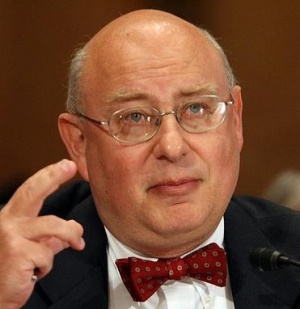Difference between revisions of "Marc Sageman"
(→Affiliations: HJS) |
|||
| Line 22: | Line 22: | ||
*[[Center for Strategic and International Studies]] (CSIS), Senior Associate (Non-resident), Europe Program, Human Rights and Security Initiative | *[[Center for Strategic and International Studies]] (CSIS), Senior Associate (Non-resident), Europe Program, Human Rights and Security Initiative | ||
*[[Decisive Analytics Corporation]] (DAC) | *[[Decisive Analytics Corporation]] (DAC) | ||
| + | *[[Henry Jackson Society]], Advisory Council: Policy Council member <ref> [http://henryjacksonsociety.org/people/council-members/ Advisory Council:Policy Council members], HJS website, undated, accessed 5 November 2014 </ref> | ||
==Notes== | ==Notes== | ||
<references/> | <references/> | ||
[[category:terrorologist|Sageman, Marc]][[Category:spooks|Sageman, Mark]][[Category:CIA|Sageman, Marc]] | [[category:terrorologist|Sageman, Marc]][[Category:spooks|Sageman, Mark]][[Category:CIA|Sageman, Marc]] | ||
Latest revision as of 08:09, 5 November 2014
Marc Sageman is a terrorism expert and practicing psychiatrist. European-born but American-educated, Sageman served in the U.S. Navy as a flight surgeon before joining the CIA in 1984. During the late 1980s, he was based in Islamabad and worked closely with the Afghan mujahideen forces that were fighting the Soviets.[1]
Contents
Development of Social Networks In Context
In July 2008 Decisive Analytics Corporation (DAC) announced that it had been selected by the US Air Force to develop new technologies to automatically identify terror networks and analyse their social context. The announcement stated that the project, termed Social Networks In Context (SONIC), builds on the company's BOBCAT approach to identifying and stopping terrorism, and that Sageman would work in partnership with DAC on the project.[2]
Dispute with Bruce Hoffman
Sageman has publicly disagreed with former RAND analyst and Georgetown professor Bruce Hoffman over the nature of the terrorist threat to the United States. Sageman has argued that the threat comes not from Al-Qaeda but from independent and self-organised individuals and groups. Hoffman on the other hand has emphasised a continued and resurgent threat from Al-Qaeda.[3]
Reviewing Sageman's book for Foreign Affairs, Hoffman wrote that Sageman has “a fundamental misreading of the Al Qaeda threat,” adding that his “historical ignorance is surpassed only by his cursory treatment of social-networking theory.”[4]
In a subsequent issue of Foreign Affairs, Sageman accused Hoffman of “gross misrepresentation” and in an interview with the New York Times, he said he was at a loss to explain Hoffman’s critique saying: “Maybe he’s mad that I’m the go-to guy now.”[5]
Books
- Marc Sageman, Leaderless jihad: terror networks in the twenty-first century (University of Pennsylvania Press, 2008) (ISBN: 9780812240658; 0812240650)
- Marc Sageman, Understanding terror networks (University of Pennsylvania Press, 2004) (ISBN: 0812238087; 9780812238082)
Affiliations
- Sageman Consulting, LLC, founder
- Foreign Policy Research Institute, Senior Fellow
- Center for Strategic and International Studies (CSIS), Senior Associate (Non-resident), Europe Program, Human Rights and Security Initiative
- Decisive Analytics Corporation (DAC)
- Henry Jackson Society, Advisory Council: Policy Council member [6]
Notes
- ↑ Bruce Hoffman, 'The Myth of Grass-Roots Terrorism', Foreign Affairs, May/June 2008
- ↑ Decisive Analytics Corporation, US Air Force Selects DAC to Develop New Technologies for Identifying Terror Networks, 2 July 2008
- ↑ Elaine Sciolino and Eric Schmitt, A Not Very Private Feud Over Terrorism, New York Times, 8 June 2008
- ↑ Bruce Hoffman, 'The Myth of Grass-Roots Terrorism. Why Osama bin Laden Still Matters', Foreign Affairs, May/June 2008
- ↑ Elaine Sciolino and Eric Schmitt, A Not Very Private Feud Over Terrorism, New York Times, 8 June 2008
- ↑ Advisory Council:Policy Council members, HJS website, undated, accessed 5 November 2014
